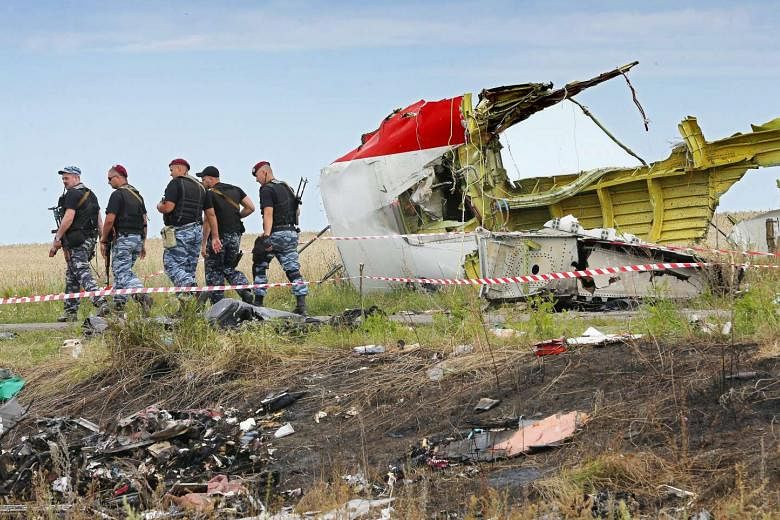GILZE-RIJEN, Netherlands (AFP) - Air crash investigators have concluded that Malaysia Airlines flight MH17 was shot down by a missile fired from rebel-held eastern Ukraine, sources close to the inquiry said on Tuesday (Oct 13), triggering a swift Russian denial.
The findings are likely to exacerbate the tensions between Russia and the West, as ties have strained over the Ukraine conflict and Moscow's entry into the Syrian war.
"It was a BUK missile that hit the left upper part of the cockpit," a visibly shaken relative, Mr Robby Oehlers, told reporters, just after being briefed by Dutch officials in The Hague.
He said a wave of sadness had swept through the room as hundreds of relatives who lost loved ones were briefed by Dutch Safety Board chairman Tjibbe Joustra.
"They showed us the fragments that were inside the plane," Mr Oehlers said, adding that in the room, "it was so quiet, you could have heard a pin drop". The official Dutch-led investigation seeks to end 15 months of speculation about why the Boeing 777 broke up in mid-air last year, killing all 298 people on board.
The reported findings were swiftly disputed by the missile maker Almaz-Antey even before the official unveiling of the investigators' report at a Dutch air base.
Earlier, quoting three sources close to the investigation, the respected Volkskrant daily said on Tuesday the inquiry had found the plane was hit by a BUK surface-to-air missile on July 17, 2014 as it flew from Amsterdam to Kuala Lumpur.
According to Volkskrant, the report contains maps of the crash site, where the wreckage was strewn across fields close to the Ukrainian village of Grabove, in the war-torn area of Donetsk controlled by the rebels.
It rejects Moscow's contention that the plane was hit by a missile fired by Ukrainian troops as it flew at some 10,000m above the territory, the daily said.
The Dutch Safety Board, which led the international team of investigators, has stressed its mandate was not to determine who pulled the trigger, amid a separate criminal probe by Dutch prosecutors.
But two sources told the Volkskrant "the BUK missile is developed and made in Russia." "It can be assumed that the rebels would not be able to operate such a device. I suspect the involvement of former Russian military officials," one told the paper.
Both Moscow and state-owned arms maker Almaz-Antey deny the claims.
Almaz Antey said on Tuesday it had performed a test which "disputes the version of the Dutch", adding that the damage to the plane pointed to the use of an older type of missile.
Russian Foreign Minister Sergei Lavrov on Monday said there were "many, many strange things" about the investigation, including the failure to get the International Civil Aviation Organisation (ICAO) to head it.
"There were no responses to the many questions that Russia sent to this investigative group," he said.
The report was due to focus on four areas. It will examine "the cause of the crash", the issue of "flying over conflict areas" and will try to answer why Dutch relatives waited two to four days before receiving confirmation that their loved ones were on board.
Relatives were shown an animated reconstruction of the explosion and Mr Oehlers said investigators believed their loved ones had had no idea they were about to die.
The haunting question had been one of the key focuses of the investigation.
"They told us there was a zero per cent chance that the people inside felt anything or had any notion of what was happening," Oehlers said.
Reporters at the air base will also be shown a partial reconstruction of the doomed plane, made from pieces of wreckage brought back from the crash site.
"Even if the report doesn't name those responsible, it will still allow us to close some doors, to have some answers," said Mr Pierre Chardom, a Belgian who lost his 51-year-old brother Benoit in the crash.
Analyst Peter Felstead of Jane's Defence Weekly told AFP the airliner was most likely shot down "by mistake" by a BUK missile crew, who crossed the border to help the rebels counter Ukrainian air threats.

